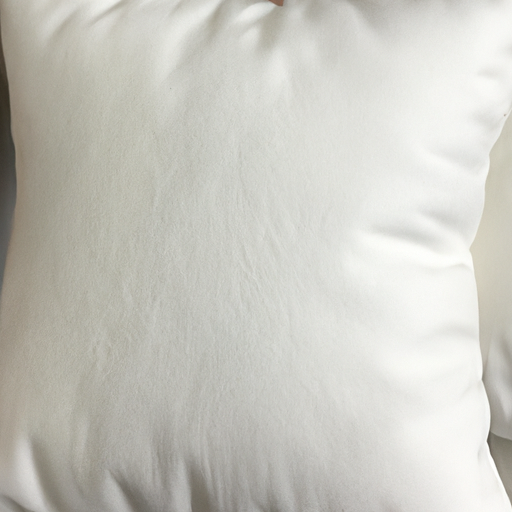-
Table of Contents
- Introduction
- How to Choose the Right Soft Supportive Pillow for Your Sleep Needs
- The Benefits of Sleeping on a Soft Supportive Pillow
- The Different Types of Soft Supportive Pillows and Their Benefits
- How to Care for Your Soft Supportive Pillow
- The Pros and Cons of Memory Foam Soft Supportive Pillows
- The Best Soft Supportive Pillows for Side Sleepers
- How to Choose the Right Firmness Level for Your Soft Supportive Pillow
- Q&A
- Conclusion
Introduction
Soft Supportive Pillows are a great way to get a good night’s sleep. They provide the perfect balance of comfort and support, allowing you to sleep soundly and wake up feeling refreshed. Soft Supportive Pillows are designed to provide the right amount of cushioning and support for your head and neck, while also helping to reduce pressure points and improve circulation. They are available in a variety of shapes, sizes, and materials, so you can find the perfect pillow for your needs. Whether you’re looking for a pillow to help with neck pain, or just want a comfortable place to rest your head, Soft Supportive Pillows are the perfect choice.
How to Choose the Right Soft Supportive Pillow for Your Sleep Needs
When it comes to getting a good night’s sleep, having the right pillow is essential. A supportive pillow can help you maintain the correct posture while sleeping, reduce neck and back pain, and provide comfort and support throughout the night. Choosing the right pillow for your sleep needs can be a daunting task, but with a few simple tips, you can find the perfect pillow for you.
First, consider your sleeping position. Different sleeping positions require different levels of support. For example, if you sleep on your back, you’ll need a pillow that is soft and supportive, while side sleepers need a firmer pillow to keep their head and neck in alignment.
Next, consider the material of the pillow. Memory foam pillows are a popular choice as they provide excellent support and conform to the shape of your head and neck. Down and feather pillows are also popular, as they are soft and comfortable. However, they may not provide enough support for some sleepers.
Finally, consider the size of the pillow. Pillows come in a variety of sizes, from standard to king size. Make sure to choose a pillow that is the right size for your bed and sleeping position.
By following these tips, you can find the perfect pillow for your sleep needs. With the right pillow, you can enjoy a comfortable and restful night’s sleep.
The Benefits of Sleeping on a Soft Supportive Pillow
A good night’s sleep is essential for overall health and wellbeing. One of the most important factors in achieving a restful sleep is the type of pillow you use. A soft, supportive pillow can provide numerous benefits, including improved comfort, better spinal alignment, and reduced neck and shoulder pain.
Comfort is one of the most important benefits of a soft, supportive pillow. A pillow that is too firm can cause discomfort and can even lead to neck and shoulder pain. A soft pillow, on the other hand, can provide the perfect balance of support and comfort, allowing you to sleep more soundly and wake up feeling refreshed.
Another benefit of a soft, supportive pillow is improved spinal alignment. A pillow that is too firm can cause your neck and spine to be misaligned, leading to pain and discomfort. A soft pillow can help keep your neck and spine in proper alignment, reducing the risk of pain and discomfort.
Finally, a soft, supportive pillow can help reduce neck and shoulder pain. A pillow that is too firm can cause your neck and shoulders to be strained, leading to pain and discomfort. A soft pillow can provide the perfect balance of support and comfort, allowing your neck and shoulders to relax and reducing the risk of pain and discomfort.
In conclusion, a soft, supportive pillow can provide numerous benefits, including improved comfort, better spinal alignment, and reduced neck and shoulder pain. If you are looking for a pillow that will provide you with a restful night’s sleep, a soft, supportive pillow is the perfect choice.
The Different Types of Soft Supportive Pillows and Their Benefits
Pillows are an essential part of a good night’s sleep. They provide support for the head and neck, helping to keep the spine in alignment and reduce the risk of neck and back pain. Soft supportive pillows come in a variety of shapes and sizes, each offering different benefits.
Memory foam pillows are a popular choice for those looking for a soft, supportive pillow. Memory foam is designed to conform to the shape of the head and neck, providing superior support and comfort. It is also hypoallergenic and resistant to dust mites, making it a great choice for those with allergies.
Down pillows are another popular option for those seeking a soft, supportive pillow. Down is a natural material that is lightweight and breathable, making it ideal for those who tend to sleep hot. Down pillows are also highly durable and can last for many years.
Gel pillows are a newer type of pillow that is becoming increasingly popular. Gel pillows are designed to provide superior support and comfort, while also helping to regulate body temperature. The gel material helps to keep the pillow cool, making it a great choice for those who tend to sleep hot.
Buckwheat pillows are a unique type of pillow that is filled with buckwheat hulls. The hulls provide superior support and comfort, while also helping to reduce pressure points. Buckwheat pillows are also highly durable and can last for many years.
No matter which type of soft supportive pillow you choose, it is important to find one that is comfortable and supportive. The right pillow can help to improve your sleep quality and reduce the risk of neck and back pain.
How to Care for Your Soft Supportive Pillow
Caring for your soft supportive pillow is essential for ensuring that it remains comfortable and supportive for years to come. Proper care and maintenance will help to extend the life of your pillow and ensure that you get the most out of it. Here are some tips for caring for your soft supportive pillow:
1. Wash your pillow regularly. It is recommended that you wash your pillow every three months to keep it clean and free of dust and allergens. Use a mild detergent and warm water and make sure to rinse thoroughly.
2. Air out your pillow. After washing your pillow, make sure to air it out in a well-ventilated area. This will help to remove any moisture and keep your pillow fresh.
3. Protect your pillow. Use a pillow protector to keep your pillow clean and free of dust and allergens. This will also help to extend the life of your pillow.
4. Fluff your pillow. Fluffing your pillow regularly will help to keep it in good shape and ensure that it remains supportive.
5. Replace your pillow. It is recommended that you replace your pillow every two to three years to ensure that it remains supportive and comfortable.
By following these tips, you can ensure that your soft supportive pillow remains comfortable and supportive for years to come. Proper care and maintenance will help to extend the life of your pillow and ensure that you get the most out of it.
The Pros and Cons of Memory Foam Soft Supportive Pillows
Memory foam soft supportive pillows are becoming increasingly popular due to their ability to provide comfort and support. While these pillows offer many benefits, there are also some drawbacks to consider before making a purchase.
Pros
The primary benefit of memory foam soft supportive pillows is their ability to provide comfort and support. Memory foam is designed to conform to the shape of the head and neck, providing a customized fit that can help reduce neck and shoulder pain. Memory foam also helps to evenly distribute weight, reducing pressure points and providing a more restful sleep. Additionally, memory foam pillows are hypoallergenic and resistant to dust mites, making them a great choice for those with allergies or asthma.
Cons
One of the drawbacks of memory foam soft supportive pillows is their cost. Memory foam pillows tend to be more expensive than traditional pillows, so they may not be the best choice for those on a budget. Additionally, memory foam pillows can be quite heavy and bulky, making them difficult to move or transport. Finally, memory foam pillows can retain heat, making them uncomfortable for those who tend to sleep hot.
In conclusion, memory foam soft supportive pillows offer many benefits, including comfort and support, hypoallergenic properties, and even weight distribution. However, they can be expensive and bulky, and may not be the best choice for those who sleep hot. Ultimately, it is important to consider all of the pros and cons before making a purchase.
The Best Soft Supportive Pillows for Side Sleepers
When it comes to finding the best pillow for side sleepers, it is important to consider the type of support and comfort that is needed. Side sleepers require a pillow that is soft and supportive, as this will help to keep the spine in alignment and reduce neck and shoulder pain. Here are some of the best soft supportive pillows for side sleepers:
1. Memory Foam Pillow: Memory foam pillows are a great choice for side sleepers, as they provide excellent support and contour to the head and neck. Memory foam is also known for its ability to reduce pressure points, making it a great choice for those who suffer from neck and shoulder pain.
2. Down Pillow: Down pillows are a great choice for side sleepers, as they provide a soft and supportive feel. Down pillows are also known for their ability to conform to the shape of the head and neck, providing excellent support.
3. Latex Pillow: Latex pillows are a great choice for side sleepers, as they provide a soft and supportive feel. Latex pillows are also known for their ability to conform to the shape of the head and neck, providing excellent support.
4. Buckwheat Pillow: Buckwheat pillows are a great choice for side sleepers, as they provide a soft and supportive feel. Buckwheat pillows are also known for their ability to conform to the shape of the head and neck, providing excellent support.
No matter which type of pillow you choose, it is important to make sure that it is comfortable and supportive. The right pillow can make a huge difference in the quality of sleep you get each night.
How to Choose the Right Firmness Level for Your Soft Supportive Pillow
When it comes to choosing the right firmness level for a soft supportive pillow, there are a few factors to consider. The most important factor is the type of sleeper you are. Different sleepers require different levels of support and comfort.
For side sleepers, a softer pillow is usually best. This will provide the necessary support for the neck and head while still allowing the spine to remain in a neutral position. A softer pillow will also help to reduce pressure points and provide a more comfortable sleep.
For back sleepers, a firmer pillow is usually recommended. This will provide the necessary support for the neck and head while still allowing the spine to remain in a neutral position. A firmer pillow will also help to reduce pressure points and provide a more comfortable sleep.
For stomach sleepers, a medium-firm pillow is usually recommended. This will provide the necessary support for the neck and head while still allowing the spine to remain in a neutral position. A medium-firm pillow will also help to reduce pressure points and provide a more comfortable sleep.
When choosing the right firmness level for a soft supportive pillow, it is important to consider your sleeping position and the type of support you need. It is also important to consider the material of the pillow and the quality of the construction. A good quality pillow will provide the necessary support and comfort while still lasting for many years.
Q&A
1. What is a soft supportive pillow?
A soft supportive pillow is a type of pillow that is designed to provide comfort and support to the head, neck, and shoulders. It is usually made from a combination of foam, memory foam, and other materials that provide cushioning and support.
2. What are the benefits of using a soft supportive pillow?
The benefits of using a soft supportive pillow include improved posture, better sleep quality, reduced neck and shoulder pain, and improved spinal alignment.
3. How do I choose the right soft supportive pillow for me?
When choosing a soft supportive pillow, it is important to consider your sleeping position, body type, and personal preferences. It is also important to consider the type of material used in the pillow, as well as the firmness and thickness of the pillow.
4. How often should I replace my soft supportive pillow?
It is recommended to replace your soft supportive pillow every two to three years, or when it begins to lose its shape or support.
5. Are soft supportive pillows safe to use?
Yes, soft supportive pillows are generally safe to use. However, it is important to make sure that the pillow is made from high-quality materials and is free from any potential allergens.
6. Can I wash my soft supportive pillow?
Yes, most soft supportive pillows can be washed in a washing machine on a gentle cycle. It is important to follow the manufacturer’s instructions for washing and drying the pillow.
7. Are there any special care instructions for my soft supportive pillow?
Yes, it is important to keep your soft supportive pillow clean and dry. It is also important to fluff the pillow regularly to maintain its shape and support.
Conclusion
The Soft Supportive Pillow is an excellent choice for anyone looking for a comfortable and supportive pillow. It is made from high-quality materials and is designed to provide maximum comfort and support. It is also hypoallergenic and dust mite resistant, making it a great choice for those with allergies or sensitivities. The Soft Supportive Pillow is an ideal choice for anyone looking for a comfortable and supportive pillow that will last for years to come.



